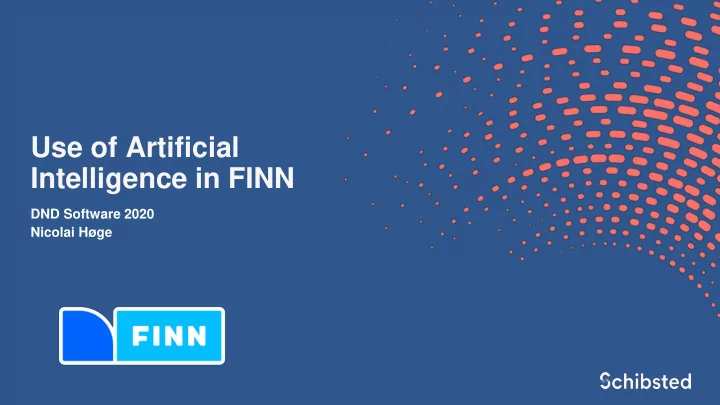

Use of Artificial Intelligence in FINN DND Software 2020 Nicolai Høge
2008 Nicolai Høge 2001 - 2006 1999 - 2001 2006 - 2008
Hva skal jeg snakke om? • Hva er kunstig intelligens og maskinlæring? • To konkrete eksempler fra FINN: • Annonsekontroll • Anbefalinger • Hva har vi lært etter 5+ år ?
What is Artificial Intelligence? ● To get machines to solve tasks, that humans need intelligence to do ● Most of the work around (AI) is open and available to everyone. That means that knowledge is not the key, but rather the access to data and competent people ● Many sub categories ○ NLP, ML, Image Recognition etc.
Why is everybody talking about Machine Learning? The computer learns how to categorize or group input Without ML Supervised Unsupervised Input Input Output Model Input Model Algorithm Output
Ad Control
Machine Learning for Ad Control Store the results Ad 500 000 changes pr / week 1 . Control 2. 3.
Human rules, manual weighting
ML weighting of rules From manual weighting to ML weighting of rules
ML generated rules From manual rules to ML generated rules
Train model with more data Train the ML model with more data
Keep tuning until “good enough”
Recommendations
One visit, many signals 100 different signals pageviews recommendation inscreen contact_action search ... Typically 100 signals pr. visit
Many visits, A LOT of signals 200-300 million signals pr. day Data lake 9 TB
From signals to recommendations AB testing Data lake 9 TB Machine Learning 30 - 40 models ● Experimentation ● Always 3-4 different ● algorithms running against each other Validation of models in ● production
Recommendations based on users or objects or Input Recommendation Output Service
One engine, many products Personalized search BLINK Recommendations Use signals to improve Recommendation recommendations Service
Results CTR 30% 1000 clicks/ min
What is under the hood?
Combining more than one model ● Collaborative Filtering works with a lot of data ● Confused with little data ● Combine text, image and collaborative filtering KDD 2018: Eide, Zhou, Øygard: Five lessons from building a deep neural network recommender
More relevant results
When things go wrong...
...and challenges Our success factors... ● Difficult to recruit the right ● Data Scientists are part of the people product development teams ● Hard to gather data ● Tons of experiments ● The models are only as good ● Our ability to create products as the data they learn from ● Off the shelves models may be good enough, but you probably need use them in inventive ways
Recommend
More recommend